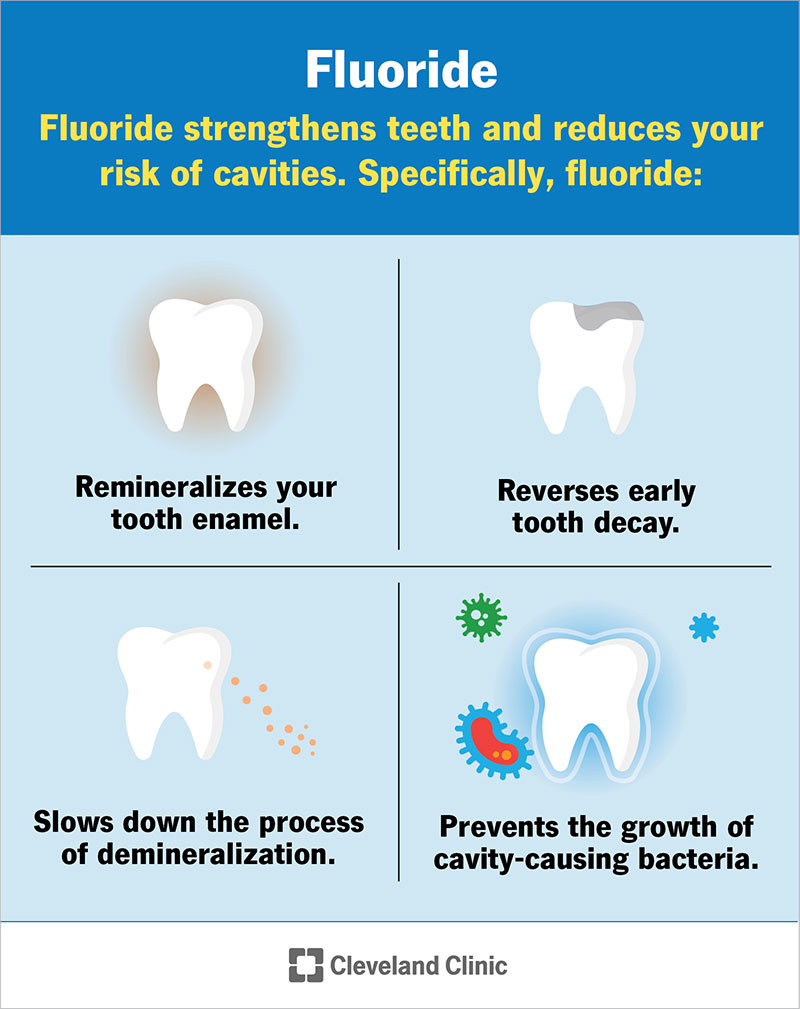Fluoride, a mineral that occurs naturally in many foods and water, helps prevent tooth decay. Fluoride reverses early decay and remineralizes your tooth enamel. While fluoride can be harmful in large quantities, it’s difficult to reach toxic levels due to the low amount of fluoride in over-the-counter products like toothpastes and mouth rinses.
Advertisement
Cleveland Clinic is a non-profit academic medical center. Advertising on our site helps support our mission. We do not endorse non-Cleveland Clinic products or services. Policy

Image content: This image is available to view online.
View image online (https://my.clevelandclinic.org/-/scassets/Images/org/health/articles/11195-fouride)
Fluoride is a naturally occurring mineral found in many foods and water. In dentistry, healthcare providers use fluoride to strengthen teeth and reduce the risk of cavities. Health experts consider fluoride safe and effective when used at recommended levels. Ask your dentist for product recommendations and how often you should get fluoride treatments.
Advertisement
Cleveland Clinic is a non-profit academic medical center. Advertising on our site helps support our mission. We do not endorse non-Cleveland Clinic products or services. Policy
Every day, your enamel (the protective outer layer of your tooth) gains and loses minerals. You lose minerals when acids — formed from bacteria, plaque and sugars in your mouth — attack your enamel. (This process is demineralization.)
You gain minerals — like fluoride, calcium and phosphate — when you consume food and water that contain these minerals. (This process is remineralization.)
Tooth decay is a result of too much demineralization without enough remineralization.
Dental fluoride helps prevent tooth decay by making your enamel more resistant to acid attacks. It also reverses early tooth decay.
Many foods and water contain fluoride. You can also purchase fluoride toothpaste and mouthwash. You can buy low-strength fluoride mouthwash over the counter. Stronger concentrations in liquid or tablet form need a healthcare provider’s prescription.
A dentist can also apply fluoride to your teeth in the form of:
Advertisement
Infants and children between the ages of 6 months and 16 years need an appropriate amount of fluoride. Developing teeth benefit from fluoride just as much as teeth that have already erupted (grown in).
The American Dental Association (ADA) recommends watching how much fluoride infants and young children take in. The ADA specifically recommends avoiding reconstituted liquid formulas, such as liquid concentrate or powdered baby formulas that require mixing with fluoridated water. Instead, the ADA recommends breast milk, ready-to-feed formula or prepared formula mixed with fluoride-free water.
These recommendations are to guard against enamel fluorosis. These are faint white streaks that can appear on tooth enamel during a child’s developmental years. This can happen even before teeth erupt through the gums.
For young children, the ADA also recommends you keep a close eye on your kids when they brush their teeth. They should:
The ADA also recommends the following:
Yes, adults can benefit from fluoride, too. You might especially benefit from fluoride if you have:
A dentist or hygienist can give you a fluoride treatment during a routine dental exam or cleaning. They’ll apply a fluoride gel, foam or varnish to your teeth. Typically, a fluoride treatment takes less than five minutes.
Fluoride strengthens teeth and reduces your risk of cavities by approximately 25%.
Specifically, fluoride:
Advertisement
The most common side effect of fluoride is fluorosis. This condition typically happens during tooth development, usually in children under the age of 6.
Fluorosis most often results from consuming naturally occurring fluoride, like that found in well water. The optimal level of fluoride is 0.7 parts per million. This is the amount in public water supplies in the communities that have fluoridated water. If you have well water, testing a sample can help determine how much fluoride is in your water.
You can’t brush fluorosis away, but a dentist might be able to use special bleaching methods to address the issue. If professional whitening doesn’t work, you can opt for dental bonding or porcelain veneers.
The answer to this question depends on your unique oral health needs. Many people benefit from fluoride treatments every six months. If you’re prone to cavities, you might benefit from more frequent treatments. To find out what’s right for you, talk to your dentist.
Fluoride is a mineral that occurs naturally in water and many foods. Using over-the-counter fluoride products can help protect your dental health. Dentists harness the power of fluoride in treatments that strengthen your tooth enamel and reduce your risk of cavities. Talk to your dentist to learn more.
Advertisement

Sign up for our Health Essentials emails for expert guidance on nutrition, fitness, sleep, skin care and more.
Learn more about the Health Library and our editorial process.
Cleveland Clinic’s health articles are based on evidence-backed information and review by medical professionals to ensure accuracy, reliability and up-to-date clinical standards.
Cleveland Clinic’s health articles are based on evidence-backed information and review by medical professionals to ensure accuracy, reliability and up-to-date clinical standards.
Dentistry plays an important role in oral health. Cleveland Clinic’s experts can design a personalized plan that will keep you smiling for the long haul.
